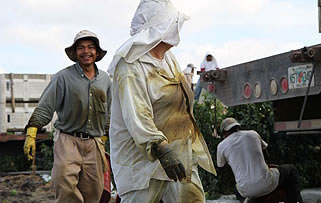
Slow pace of progress through court system underscores swift response, justice of Fair Food Program
The December 20 edition of the LaBelle, Florida, weekly, The Caloosa Belle, included these four short lines of text in its “Arrest Reports” column:
Garcia Farias was arrested in connection with the March, 2012, beating of a worker (pictured above, his nose freshly broken by his supervisor’s punch) at an Immokalee area eggplant packing house. Nine full months passed between the incident and the arrest, despite the fact that the victim reported the battery to police that same day, as quickly as he could get away from the packing house.
At the time of the incident, we posted a reflection that focused on the growing divide taking shape in Florida’s fields between farms that did business the old way — characterized by an underlying dehumanization of workers — and those that had joined the Fair Food Program (FFP), where the old ways are no longer tolerated and workers fully participate the ongoing development of a more modern workplace. Here’s an extended excerpt from that reflection:
“A man can’t ride your back unless it is bent”…
Those words were spoken by Dr. Martin Luther King on the eve of his assassination, in his ever powerful “Mountaintop” speech in Memphis, Tennessee, April 3, 1968. Speaking about the Civil Rights movement in Albany, Georgia, he said, “Whenever men and women straighten their backs up, they are going somewhere, because a man can’t ride your back unless it is bent.”
Today, in tomato fields across the state of Florida, the men and women who pick this country’s tomatoes are indeed going somewhere, through the Fair Food Program. Not only have they won new rights and protections against exploitation and abuse (verbal and physical), but they are learning about those rights, on the farm and on the clock, through the CIW’s educational efforts, and are enforcing those rights through the Fair Food Program’s protected complaint mechanism.
They are straightening their backs up, and — in a true partnership with those growers who have made a real commitment to the Fair Food Program — taking steps to eliminate violence and humiliation in Florida’s tomato fields, to end the long nightmare of the state’s Harvest of Shame.
That is not to say that all is right in the fields where the Fair Food Program is in effect. But it does mean that workers and employers determined to improve conditions in the tomato industry now have real, effective tools with which to identify and eliminate the abusive bosses and exploitative structures that have plagued the industry for decades. And they have done so this season, time and time again, on participating farms from Homestead to Ruskin.
But what’s even more interesting is what’s happening at farms outside of the Fair Food Program — whether they are vegetable fields outside the tomato industry, or tomato fields where growers have refused to join the Program. With increasing frequency, the CIW and Program auditors are receiving complaints from workers who, having picked tomatoes on participating growers’ farms earlier in the season, now find themselves working for companies beyond the reach of the Program, where conditions are every bit as harsh and demeaning as they ever were.
These workers, who received the orientation on workers’ rights under the Fair Food Code of Conduct at a participating farm, confirm the positive impact of the Program every time they call with complaints ranging from verbal and physical harassment to forced overfilling of buckets and systemic minimum wage violations on non-participating farms.
Having seen the New Day taking shape in participating growers’ fields, they are shocked anew at the conditions as they used to be, and continue to be, in fields outside the Fair Food Program. And while the distinction is good news for workers on the participating farms, it is also good news for the participating growers themselves, who, thanks to the more humane workplace environment they are creating this season, are better able to attract and retain workers, leading to lower turnover, reduced training costs, and higher productivity…” read more
To illustrate this distinction, let’s take a typical beating case, an event of violence by a supervisor against a worker, and follow it through the two worlds, a farm participating in the Fair Food Program and one that isn’t.
 On the non-FFP farm, if a worker is assaulted by his supervisor, in most cases the worker simply chooses to leave the job and seek employment elsewhere. The supervisor has established his control over the workplace, the worker feels powerless to challenge it, and the resulting hierarchy is perceived and understood by other workers on the job in no uncertain terms.
On the non-FFP farm, if a worker is assaulted by his supervisor, in most cases the worker simply chooses to leave the job and seek employment elsewhere. The supervisor has established his control over the workplace, the worker feels powerless to challenge it, and the resulting hierarchy is perceived and understood by other workers on the job in no uncertain terms.
In the event the worker does decide to challenge the assault, almost without exception he does so from a safe distance. Having left the job, he makes a complaint to the police, taking the first step down a very slow, labyrinthine, and ultimately uncertain path toward justice. Some of the many challenges he will face in the next year or more include: language barriers that tilt the scales of justice strongly toward the supervisor, the fear, vulnerability and mobility of any potential witnesses, and the long delay built into the system itself. These hurdles often drain even the victim of his will to see the case through, not to mention his (and any willing witnesses’) availability, as his life as a migrant worker may well have led him a thousand miles from the town where he was assaulted by the time the case comes to trial.
Finally, in the extremely rare event the supervisor is found guilty, a year or more after the assault he may go to jail. But in the meantime the worker has moved on, the other workers who witnessed the event have also likely moved on without ever having seen justice done, and the supervisor has remained on the farm, reminding workers every day by his very presence of his power over their lives.
 On a Fair Food Program farm, however, the story is very different. First, violence by supervisors is far, far less likely to happen than it ever was in the past, because on FFP farms, if a supervisor beats a worker, the grower can lose a significant amount of business almost overnight. The market consequences for violations under the Fair Food Code of Conduct are real and they are nearly immediate. Combined with the fact that workers on FFP farms are informed of their rights under the Program, and what to do if those rights are violated, through the worker-to-worker education program, the prospect of market consequences ensures that the farms within the FFP police themselves far more closely than do those farms that operate outside of the Program.
On a Fair Food Program farm, however, the story is very different. First, violence by supervisors is far, far less likely to happen than it ever was in the past, because on FFP farms, if a supervisor beats a worker, the grower can lose a significant amount of business almost overnight. The market consequences for violations under the Fair Food Code of Conduct are real and they are nearly immediate. Combined with the fact that workers on FFP farms are informed of their rights under the Program, and what to do if those rights are violated, through the worker-to-worker education program, the prospect of market consequences ensures that the farms within the FFP police themselves far more closely than do those farms that operate outside of the Program.
But in the event an assault does occur, what happens next is truly a sea change in the history of farmworker rights. If a worker is assaulted, that worker can call — immediately, even from the field — the FFP hotline. That call is answered by a staff member of the Fair Food Standards Council, the monitoring body established to oversee compliance with the Fair Food Code of Conduct. The complaint then initiates a prompt investigative process. The worker is interviewed without further delay, witnesses are interviewed at or off the farm, management is informed and involved, and a finding is issued. All of this normally occurs within a matter of days (although more complex investigations may take up to several weeks). The entire investigative process is underpinned by the clear and absolute protections against retaliation contained in the Fair Food Code of Conduct. This protection helps witnesses overcome the fear of losing their own jobs, or worse, that so often cripples investigations on non-FFP farms.
If the FFSC determines that an assault took place, the supervisor is fired and an education process is undertaken — at the management level as well as in the fields — to reinforce the message that violence will not be tolerated on that farm. This resolution and message are backed by the business of the eleven multi-billion dollar retailers that have signed Fair Food Agreements with the CIW. And, in addition to the FFP process, the victim can of course still pursue a criminal complaint, but that process will then unfold without the assailant ever-present in the workplace, a very different context than that on a non-FFP farm. In this way, rather than supplant the criminal justice system, the FFP in fact supplements it.
In many ways, as impressive as the early results have been from the FFP, this tale of two farm labor worlds is still a developing story. The Program is entering only its second full season of operation on the vast majority of Florida tomato farms and so remains very much a work in progress. Adoption by the different growers of the new standards and structures put in place through the FFP is still not uniform — some growers have eagerly embraced the Program, others only reluctantly. Meanwhile, the beating case at the top of this post, a case which illustrates many of the difficulties faced by workers locked in the non-FFP system, is also many steps from completion. It would be premature to comment much further before it is resolved.
 But one thing is already beyond doubt: Workers within the Fair Food Program have access to a complaint process that has never existed before in the history of Florida agriculture. That process is quickly approaching its 200th complaint, the vast majority of which have been investigated and resolved within a matter of weeks, if not days, to the expressed satisfaction of the workers involved. This new reality is, each day, changing lives and building a more humane workplace in Florida’s fields.
But one thing is already beyond doubt: Workers within the Fair Food Program have access to a complaint process that has never existed before in the history of Florida agriculture. That process is quickly approaching its 200th complaint, the vast majority of which have been investigated and resolved within a matter of weeks, if not days, to the expressed satisfaction of the workers involved. This new reality is, each day, changing lives and building a more humane workplace in Florida’s fields.
We will revisit this developing story in the months ahead as the case proceeds through the court system and the FFP continues to mature in its second full season. In the meantime, know that, thanks to the FFP — and to the Fair Food movement that has marched, fasted, and protested across the country to make the FFP a reality — workers in Florida’s tomato fields today have a powerful new tool at their disposal when faced with abuse.
